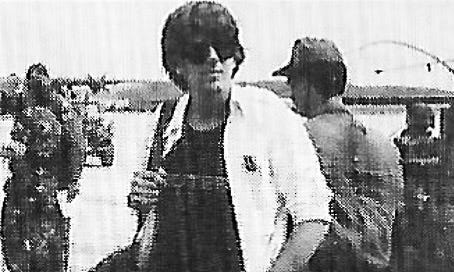Laughing, carefree people jostled around me in the Customs line at the Barbados Airport. More straw hats and flowered shirts than I ever expected to see in one place. They were there for a Caribbean getaway, and they could already taste the rum.
We would call them vacationers. The Brits call them holidaymakers, which I mention only because I think it’s a really fun word. Holidaymakers. We need more words like that.
Sadly, I was not there as a holidaymaker. I had been awake for 30 hours straight, I was in a line where they were searching all the suitcases, and I was probably going to have some explaining to do. The Customs woman on duty looked overworked and not especially sympathetic.
I was there to cover the war next door.
For me, today had begun yesterday. I had worked the overnight shift, editing Reuters news stories from around the world in our New York City office. The overnights are a necessary evil at any 24-hour news operation, so we all took our turns.
It was almost impossible to get out of an overnight shift. Indeed, the few avenues of escape were strikingly similar to the ones which some guys had employed to avoid the draft in my younger years: if you wanted to ditch the midnight shift, you could either shoot yourself in the foot or move to Canada.
I was at the filing desk finishing a seven-night stretch. My mind was stuffed with cotton. Words no longer held any meaning.
It was almost 7 a.m., and my freedom was in sight. Then, with scant seconds left to go, the phone rang.
“This is Keith, in Caracas. I need to dictate a news flash!”
I struggled to process his words. In wire service jargon, a flash was the most urgent story category we had. When you punched the button on one of those, it was going to ring bells and bully its way to the front of the newsfeed in thousands of newsrooms around the world.
I had never filed a flash. I just knew people who knew people who had.
My colleague at the next desk was getting ready to begin the day shift. I covered the receiver and said, “Do we know a Keith, in Caracas?”
He nodded, so I told Keith, in Caracas, to go ahead and dictate his flash.
“Official: U.S. troops invade Grenada,” he said.
That word, “Official,” was crucial. It meant we were reporting news from someone with the authority to announce it, and not from some taxi driver who had just heard about the invasion from his haberdasher’s barista.
My colleague read it over my shoulder for a second pair of eyes, a required precaution at Reuters. We exchanged an anxious glance, and I sent it on its way. Either I had just broken the news of a real war, or else I had been the victim of a career-ending practical joke.
There wasn’t a lot of ground in-between the two.
About the 1983 Grenada war. You can look it up. Let’s just say there wasn’t much chance the U.S. was going to lose, and leave it at that.
When I got home to my apartment, my phone was ringing. It was my editor. “Pack some clothes and take the next shuttle to D.C.,” he said. “They’re going to need help down there. There will be stories all day long from the White House, State Department, Pentagon. You know the drill.”
It was late October, getting colder by the day. I had seen frost on the windshields on my walk home. I stuffed some heavy sweaters and a woolen stocking cap into a small carry-on suitcase, and ran for a taxi.
I reached our Washington bureau a couple of hours later, and the bureau chief greeted me with a look of sympathetic embarrassment.
“I’m sorry, you have to go back to the airport. They want you in Grenada! But listen, you can’t get to Grenada, nobody can get in right now, so we’re setting up a temporary bureau nearby in Barbados.
“One of our guys has already arrived, and he’ll be waiting for you. We’ve taken rooms at the Sandy Beach Motel.”
Here is a tip for you aspiring young journalists. If you want to impress the bosses back at the home office with the dangers and deprivations of your assignment, never, ever, tell them you’re saying at a place called the Sandy Beach Motel. And for Lord’s sake, don’t tell them the Sandy Beach bartender makes the best Planter’s Punch in all of the Caribbean.
I’m trying to help you out here, so take notes.
I asked who I was supposed to meet at the Sandy Beach, and he looked down at the message.
“It’s Keith, from Caracas. You know him?
“We go way back,” I lied.
(The sweetheart photo)
Anyway, this was how I came to be shuffling through Customs along with the holidaymakers, gripping a small suitcase jammed with roasty-toasty ski resort clothing, in a place where it was 88 degrees outside.
To be fair, I didn’t honestly think I would be dragged off to the pokey just for trying to smuggle sweaters into tropical Barbados.
I wasn’t trying to pull the wool over their eyes – I’m sorry, I just couldn’t resist saying that - but I did think it would lead to questions I didn’t have the time or patience to answer, since my only interest was getting to the nearby island that was being invaded.
Finally, I made it to the front of the line. Scowling Customs Lady had just unfolded every article of personal clothing from another traveler’s suitcase and invited him to re-pack it at a nearby card table. This wasn’t going to be pretty.
I put my suitcase down in front of her and lifted the lid. Her gaze landed on the top item, and she picked it up. It was my favorite photo of Barbara, in a small brass frame. She is wearing a white-collar, green-striped rugby shirt. Looking sideways into the camera, she is poised to say something sweet, sarcastic, or both.
Scowling Customs Lady looked at it for several seconds. Visibly softening, she looked back at me.
“Is this your sweetheart?”
“It’s my wife.”
She smiled. “If you travel with her picture, then she is your sweetheart, too.”
The woman gently replaced the photo and closed my suitcase, without a second glance at anything else in it.
“Welcome to Barbados,” she said. Enjoy your visit.”
Just a couple of days later I would actually be reporting from Grenada, racking up those gripping yarns journalist love to tell each other. I guess one day I will write about those, but somehow it is this sweetheart story that I always think of first, whenever small autumn wars cross my mind.






And she is STILL your sweetheart, and wow, did you land a great one!!! Barbara has saved the day more than once, I'll wager, but she may not want to tell ALL of the stories. Great one, Bob. Thanks for reminding us what counts.
Your best ever! I started reading it in a "Joe Friday" voice. "For me, today had begun yesterday". See how that works? BTW, I still have the Grenada t-shirt you gave me.